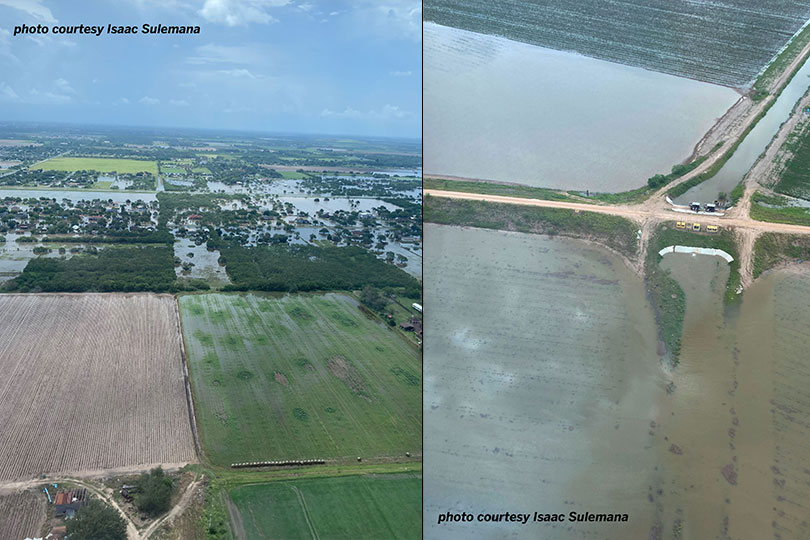By Jennifer Dorsett
Field Editor
Farmers, ranchers and other agribusinesses in the Lower Rio Grande Valley (LRGV) and Coastal Bend suffered major losses when Hurricane Hanna slammed into the lower Texas Gulf Coast in late July.
For many, it was the third consecutive year to experience crop losses due to summer floods.
“Three consecutive years of devastation is hard to sustain,” Texas Farm Bureau (TFB) National Legislative Director Laramie Adams said. “Cotton, citrus, sugarcane, sesame seed and grain sorghum were hit hardest. The total amount of damage to crops is staggering.”
Hurricane Hanna brought anywhere from 10-20 inches of rain and 90 mile-per-hour winds, ripping citrus fruit from trees and pulling cotton from the bolls. Other crops were left standing under water or laid over by the high winds.
Direct crop losses in the 32-county area are estimated at $176.6 million, according to Texas A&M AgriLife Extension Service. Cotton farmers were already facing hardships and a much smaller than usual crop due to intense drought during planting. Now, the Cotton and Grain Producers of the Lower Rio Grande Valley Association estimates 85-98 percent of the 2020 cotton crop is a complete loss.
AgriLife estimates show the citrus sector will lose more than $66 million damages from Hurricane Hanna. The perennial crop was reduced by almost one-third, a loss citrus growers will likely feel for several years.
But TFB and other agricultural and commodity organizations are working to secure federal assistance for those affected.
“We‘re doing everything possible to help get these farmers some assistance to keep them in business and be able to keep going,” Adams said. “It’s been a great team effort between agricultural groups in Texas. Some of the organizations supporting these efforts on hurricane recovery did not have members impacted by the hurricane, but they want the best for Texas agriculture. They want farmers and ranchers of all commodities to stay in business. This support is greatly appreciated.”
This week, TFB and 34 other agricultural organizations sent a letter to U.S. Secretary of Agriculture Sonny Perdue and members of the Texas Congressional delegation asking for an extension of the 2020 U.S. Department of Agriculture (USDA) Wildfires and Hurricane Indemnity Program Plus (WHIP+) to help farmers and agribusinesses that incurred losses from Hurricane Hanna.
Extending WHIP+ would assist LRGV and Coastal Bend farmers who typically make planting and crop insurance decisions on a much different cycle than most American farmers due to the climate and growing seasons of the area.
“Although producers had the option to purchase Hurricane Insurance Program-Wind Index (HIP-WI) policy endorsement for this season, few were aware of the product. The announcement of the HIP-WI policy endorsement came too late in the season for farmers in the LRGV and Coastal Bend area,” the letter stated. “While producers had until April 30 to purchase the endorsement, the sales closing date for spring planted crops in most of South Texas is Jan. 31, and most had already made their crop insurance purchase decisions. While area farmers will possibly utilize this product in the future, assistance is currently needed to help them recover from the devastating losses from Hurricane Hanna.”
The groups also specifically asked lawmakers to include future year losses for multi-year crops, such as citrus and sugarcane, under any WHIP+ extensions.
“TFB is working with members in the area who were impacted, as well as Secretary Perdue, our Congressional leaders and the governor’s office to take whatever avenue is needed to secure funding for these folks who suffered major losses,” Adams said.
He noted the organizations have also asked for assistance for cotton ginners, sugarcane mills and other related businesses impacted by the loss of area crops.
Following the storm, Texas Gov. Greg Abbott declared 32 LRGV and Coastal Bend counties as state disaster areas.
Abbott also sent a letter to USDA requesting the agency issue a disaster designation for Brooks, Cameron, Hidalgo, Jim Hogg, Kenedy, Starr, Willacy and Zapata counties, which would make federal assistance like emergency loans available to farmers and ranchers in those areas who suffered losses from Hurricane Hanna.

